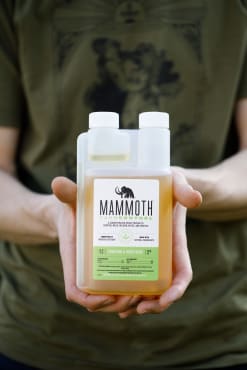We recommend first testing your solution on a few leaves and observing for 2 days; discontinue use if you see signs of burning. Do not use it on newly planted cuttings or on plants stressed by drought, and avoid application when temp exceeds 90°. Stop applications 2–3 weeks prior to harvesting your crop to ensure all the oil has broken down. As with any horticultural oil, do not apply this product when bees are actively foraging, and avoid applying within 30 days of sulfur-based fungicides. Exempt from EPA registration. Please see pesticide label here. MOFGA. NEW!
Mammoth® CannControl
Mammoth® CannControl
Additional Information
Plant Protection and Last Resorts
These products come with detailed instructions on their labels. Contact us in case you don’t receive the attached booklet or if the label is illegible.
While we try to stay current with product specifications, product formulations are subject to change without notice.
Use our Sprayers to apply these products. We welcome your suggestions about successful low-impact pest-control methods or products.
Is that pesticide registered in your state?
Each state treats potentially dangerous items differently. Like alcohol and open-carry laws, pesticide registrations are different everywhere. We cannot ship a pesticide to a state where it is not registered.Before buying or using any pest- or disease-control product, be sure it is registered for use in your state and, if you are a commercial grower, registered for commercial production.
Purdue University has a searchable database of information for most states. You can look up products by name, registration number or active ingredient. Contact information is provided for states that don’t participate in the website.
Click here for a chart summarizing the safety of these pesticides for pollinators.
USDA NOP rule concerning disease and pest control
Caution certified-organic growers:
Before using any of these products for pest or disease control, you must have followed the National Organic Program rule 205.206(e). A product being labeled here as allowed is not sufficient to meet standards for organic certification.Click here for more information and the complete text of the rule.
Organic Certification
Inoculants, soil amendments, fertilizers, livestock supplies and pesticides are labeled as:
OMRI: Organic Materials Review Institute. Most state certifying agencies, including MOFGA, accept OMRI approval.
MOFGA: Reviewed and approved by the Maine Organic Farmers & Gardeners Association Certification Services. Allowed for use on MOFGA-certified farms. Check with your certifier.
WSDA: Listed by the Washington State Department of Agriculture’s Organic Certification division for use in organic agriculture in Washington State. MOFGA has indicated that they will accept products on this list for their certification program. Check with your certifier.
Nat’l List: One-ingredient products on the NOP* List of Allowed Substances (subpart G of the Organic Foods Production Act, sections 205.601-606). Check with your certifier.
AYC: Ask your certifier. Has not been reviewed by a certifier, but the active ingredient is allowed. Ask your certifier.
Not Allowed: A few of the products we list are not allowed for organic production but we think they have a place in sensible agriculture and can be used when certification is not an issue.




